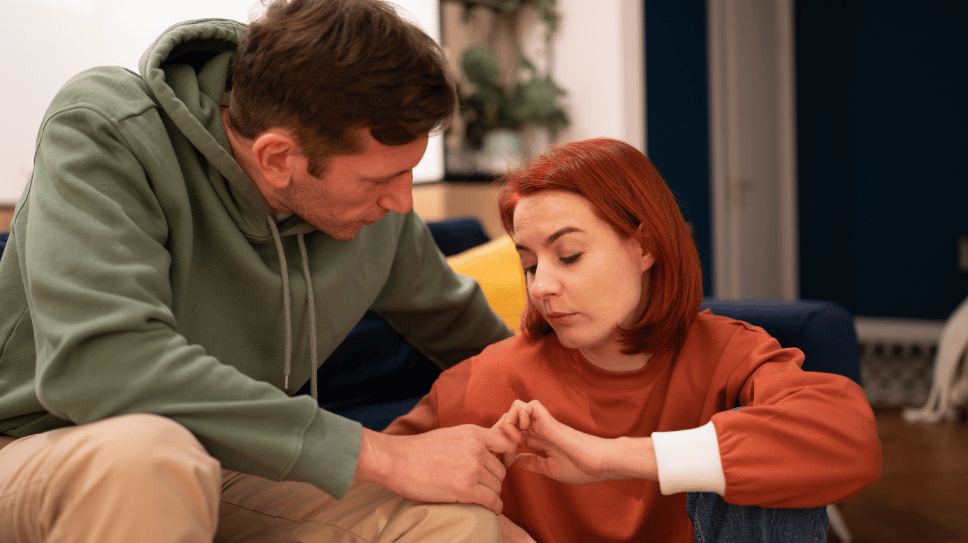Helping a loved one deal with addiction is difficult. Spouses, especially, are one of the closest people to the person with addiction, aside from children or another family.
They often carry the burden of life with that person, for better or for worse. Intimate relationships can provide a safe space to deal with life’s challenges but may also become safe harbors in the wrong way. Enabling behavior may occur, which makes it hard to get the spouse’s help for addiction. Sometimes both people are addicted to substances, which creates an explosive situation. A close partner with addiction needs support but also treatment to deal with underlying issues and face the reality of their substance use.
Substance Use and Relationships
A cycle of conflict can occur in relationships where substance abuse is present. This may be emotional or physical conflict. This may be disagreements about the abuse of substances. Other concerns that may occur can include financial issues, legal conflicts, and verbal or physical abuse. Alcohol and drugs may impair judgment, arouse angry feelings or build resentments. This can create conflict at home. Experiences of abuse or signs of abuse should be taken seriously. Anyone who feels at risk or in danger of abuse should seek help immediately. Online resources and support are available. Sometimes people are not at risk of this but rather risk losing financially or otherwise due to their partner’s addiction.
Enabling Behavior
The most effective way to support a partner who is in rehab is to focus on positive behaviors. It is easy to get stuck in the past but that will only make things more challenging for everyone in the family. Enabling is when a behavior is allowed to continue but it doesn’t always seem like enabling. Some examples might include:
- Letting a partner drink and driving them home knowing they have had too much (again)
- Letting them neglect duties or responsibilities at work or home due to substance use
- Making excuses for poor behavior or decisions
- Neglecting personal needs for self-care to take care of them
To tell if enabling behavior has begun, it helps to look at some things. Lying, making excuses, or creating explanations for a partner that allows them to remain in denial are probably enabling more than supporting. Codependency is when a couple lives with substance addiction and can fall into the enabling category. When the partner gets close to recovery, the person with codependency may undermine the process to retain feelings of self-esteem. Healthy boundaries are always good for everyone involved.
Treatment Options
When couples work together in rehab, they usually do better in recovery. Family therapy and group counseling can be helpful for people in rehab because it strengthens the relational bonds but also promotes healing from past hurt. Paying for treatment is a challenge for people and puts stress on the relationship. Couples therapy is focused on helping the couple achieve success in recovery together and work through enabling or destructive behaviors that might derail the recovery. Some skills they might learn are how to hold healthy boundaries, developing a solid treatment plan with goals, and supporting self-care in recovery.
Sustaining Recovery
When a spouse comes home from rehab, there may be expectations of them being healed and ready to roll forward. There is no cure for addiction. When the loved one comes home, it helps to remove traces of substances and alcohol from the environment or hide pills and other things for a time. They may be too triggering for them in the interim period. Recovery in that first year can have many pitfalls that lead to relapse. Friends who show up at the home or parties that are hosted also should be sober and not a place for substances that might trigger the loved one. In turn, they also need to work their program and focus on healing so they are not coping negatively with triggers. It will take time for them to develop strategies that work and find useful tools. This is a lifelong journey of discovery and healing.
Building Hope
When a loved one struggles with addiction, everyone in the family suffers. Spouses often are the ones who experience the most direct impact of someone’s addiction. They show up when they need help, bail them out, and even try to talk them out of things when they are addicted that might hurt themselves or others. To battle against it together, a spouse also needs support to build hope for the future they envision together. Many spouses struggle with co-dependent behavior or enable the loved one to continue their addiction. They also need hope they can stop doing one thing that keeps their loved one addicted and continue to help them find healing.



